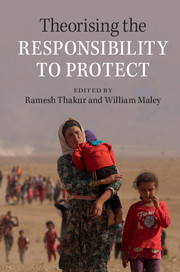Book contents
- Frontmatter
- Contents
- List of figures
- Notes on contributors
- Part I Context
- Part II The Responsibility to Protect, normative theory and global governance
- 5 The Responsibility to Protect and world order
- 6 International law and the Responsibility to Protect
- 7 The Responsibility to Protect, multilateralism and international legitimacy
- 8 Global governance and the Responsibility to Protect
- 9 International law, the Responsibility to Protect and international crises
- 10 The Responsibility to Protect and the just war tradition
- 11 War is not the answer: the Responsibility to Protect and military intervention
- Part III The Responsibility to Protect and international social purposes
- Index
5 - The Responsibility to Protect and world order
from Part II - The Responsibility to Protect, normative theory and global governance
Published online by Cambridge University Press: 05 August 2015
- Frontmatter
- Contents
- List of figures
- Notes on contributors
- Part I Context
- Part II The Responsibility to Protect, normative theory and global governance
- 5 The Responsibility to Protect and world order
- 6 International law and the Responsibility to Protect
- 7 The Responsibility to Protect, multilateralism and international legitimacy
- 8 Global governance and the Responsibility to Protect
- 9 International law, the Responsibility to Protect and international crises
- 10 The Responsibility to Protect and the just war tradition
- 11 War is not the answer: the Responsibility to Protect and military intervention
- Part III The Responsibility to Protect and international social purposes
- Index
Summary
Intervention for human protection is a key component of liberal thinking on world order. It is as old as the states system itself. A defence of intervention on humanitarian grounds can be found in Grotius’ Laws of War and Peace, and it featured in the doctrine and practice of European great powers during the period when European hegemony was consolidated. The British effort to abolish the trade in slaves in the early-to-mid-nineteenth century is a case in point, a practice that was recently described as ‘the most costly international moral action recorded in modern history’.
Despite the longue durée of the practice, protective intervention remains both institutionally complex and normatively contested in world order today. The fissures in the international community were evident both during and after the intervention in Libya in 2011 led by the North Atlantic Treaty Organization (NATO). Supporters of the intervention were quick to argue it was a ‘textbook case’. After all, it was multilateral, it was decisive, it had UN Security Council approval and the mission to protect civilians was accomplished with very low casualty figures. For detractors, the acronym NATO once again stood for ‘not altogether thought out’ (as Ken Booth once put it, only this time during the Kosovo crisis in 1999). The liberal-left intellectual David Rieff argued that ‘the campaign in Libya has done grave, possibly even irreparable, damage to R2P's prospects of becoming a global norm’.
Whether Russia and China are right to feel betrayed by the alleged shift in the Libya mandate from the protection of civilians to regime change, what is not in doubt is that the subsequent paralysis inside the Security Council has enabled the Assad regime to commit mass atrocities with virtual impunity. As Lakhdar Brahimi put it in a recent Security Council briefing, ‘the solution of that war is in your hands, members of the Security Council’.
Perhaps, when it comes to using force to defend human rights, there will always be normative tension, not least because of the disjuncture between means and ends (as one critic put it, ‘how can a bomb ever be humanitarian?’). But was the intensity of the backlash evident since 2011 merited or anticipated?
- Type
- Chapter
- Information
- Theorising the Responsibility to Protect , pp. 81 - 100Publisher: Cambridge University PressPrint publication year: 2015
- 6
- Cited by



